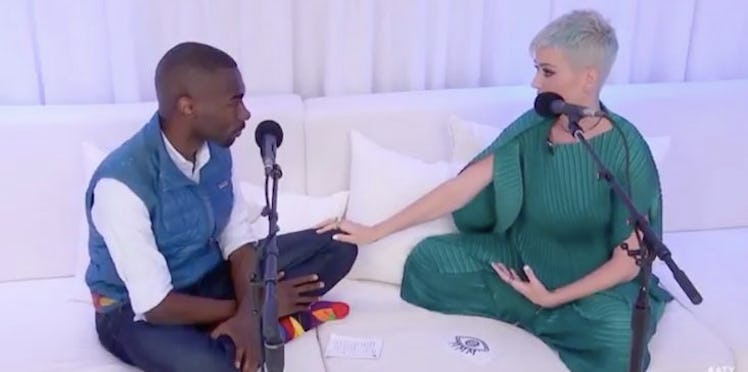
Katy Perry Finally Addressed Her Cultural Appropriation, But Here's Where She Went Wrong
Katy Perry has been on an explanation spree the last few days, seemingly to clear up misconceptions about her music and her image. In a Rolling Stone interview, she put the Taylor Swift beef to bed, at least on her behalf.
Perry also sat down with popular political activist, DeRay McKesson, for his podcast called, "Pod Save The People," to talk about her involvement in the Hillary Clinton campaign and the use of her platform to contribute to other good causes.
The conversation steered toward the cultural appropriation accusations that have followed Katy Perry throughout nearly her entire career.
During The Podcast, Perry Admitted To Appropriating Other Cultures.
She called out specific times when she has done so, telling McKesson,
I've made several mistakes, even in like the “This Is How We Do” video about how I wore my hair. [I had a] hard conversation with one of my empowering angels, Cleo, about “ What does it mean? Why can't I wear my hair that way? What is the history behind wearing the hair that way?" And she told me about the power in black women's hair and how beautiful it is and the struggle and I listened. I won't ever understand some of those things because of who I am. I will never understand but I can educate myself and that's what I'm trying to do along the way.”
Perry is referring to a scene in the video, released in 2014, when she sported cornrows while video chatting with a friend named "Jessica Thot."
The cornrows are a hairstyle historically worn by African Americans who are often penalized in public spaces for the same look that served as a stylish moment for Perry.
The singer also pointed out a time when she appropriated Japanese culture at the 2013 American Music Awards, saying,
Even in my intention to appreciate Japanese culture, I did it wrong with a performance and I didn't know that I did it wrong until I heard people saying I did it wrong and sometimes that's what it takes.
Katy Perry's statements seemed heartfelt and it was obvious that cultural appropriation is something she has thought in-depth about on more than one occasion.
Still, Perry Veered Left When Discussing How She Prefers To Be Called Out For Appropriation.
Perry shared,
It takes someone to say, out of compassion, out of love, “Hey, this is where the origin is. Do you understand?” And not just a clapback because it's hard to hear those clapbacks sometimes and your ego just wants to turn from them. I have been so grateful to have great teachers and great friends that will even hold me accountable. Even when I said I wasn't a feminist, 'cause I didn't know what that word meant. Someone pulled me aside in a quiet space and didn't shame me and didn't judge me. My friend, Shannon, she just said, “Sweetheart, I love you and I just want to show you what the Webster's definition in the dictionary says about what it means to be a feminist. And it's just equality.”
In short, Katy Perry seems to prefer that people online address her appropriation with "love," based on the comparison she made between her actual friends who corrected her and people she does not know online. This mindset shows she hasn't quite found her footing with how interactions work between privileged and oppressed people.
Though it should go without saying, people online who do not know Katy Perry, but are having their culture exploited for profit by her should not be held to the same standard as her close friends.
They are not obligated by history of relationship to approach her in a "quiet space" to help her learn about why exploiting them is wrong.
It is also worth pointing out that Perry did not require this same "quiet space" confrontation when she was blasting Taylor Swift during their now quelled beef. Perry wanted to stand up for herself against Taylor Swift, therefore she did.
And so it goes with the people of color whose culture Perry has repeatedly stolen for stages, long after the 2014 video when she said she "learned" why it was wrong.
Privileged people do not get to decided how oppressed people react to their own oppression. That's like slapping someone and then getting upset that they are upset about being slapped. You do not get to offend a group of people and then feel victimized that they do not approach you in "love."
It is white, rich, and famous privilege that even allows this utopian concept to be a situation for Perry to prefer in the first place — instead of taking full responsibility for the backlash that her behavior initiated.
It's sweet that Perry has such an appreciation for other cultures, but the pop star is going to need to do more than admit to her "mistakes." She needs to acknowledge that her actions create a reaction that she is not allowed to pick and choose her way out of.